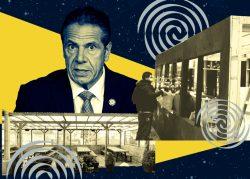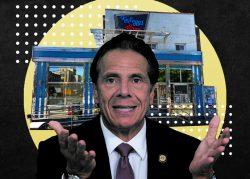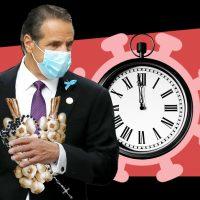Our Wicked Lady, which describes itself as a “bar for Brooklyn’s artist community,” has spent $10,000 retrofitting its business to comply with social distancing mandates since the onset of the coronavirus pandemic. The venue has kept its rooftop bar open for service, with masks and reservations required for patrons. It’s even launched a GoFundMe to try and stay in business.
Even so, the Bushwick venue has lost $445,000 in revenue since Mar. 15, around when the city and state forced restaurants to close down indoor dining, according to a new lawsuit. And it’s not alone.
Our Wicked Lady is one of 70 bars and restaurants named as plaintiffs in the complaint filed in federal court against Gov. Andrew Cuomo. The venues, many of which are located in north Brooklyn, allege that the state’s ever-changing restrictions for indoor and outdoor dining violate their civil rights.
Read more



The complaint, filed in the U.S. District Court of the Southern District of New York, argues that the restrictions violate the Federal Civil Rights Act, as well as the Due Process and Equal Protection clauses of the 5th and 14th Amendments. It also challenges the state’s concept of a “non-essential” business — restaurants and bars are included, but only for takeout and delivery — arguing that the designation is arbitrary and unconstitutional.
“No business should be considered ‘Non Essential’ if it affects the livelihoods of hundreds of thousands, if not millions, of New Yorkers,” the complaint reads. “No business that is responsible for feeding and clothing the family members of its workers and owners, in such great numbers, can be justly labelled ‘Non Essential.’”
Other plaintiffs named in the lawsuit include the nightclub Baby’s All Right, event space Wonderville, and bars The Narrows, Heavy Woods and The Richardson.
The lawsuit also alleges that the guidelines for indoor and outdoor dining — which have changed many times over the course of the past 10 months — are a “Kafkaesque nightmare” that have compounded the hardship many of these venues face.
“Plaintiffs expended tens, if not hundreds of thousands of dollars to do so, only to have the rules subsequently changed on them with new and even more arbitrary restrictions imposed,” the lawsuit reads. “This was done without taking into any consideration the costs incurred by the Plaintiffs or conducting a proceeding wherein the Plaintiffs could be heard with respect to their concerns.”
Lawyers for the plaintiffs, nor representatives for Cuomo responded to requests for comment.
Two similar lawsuits have been filed against Cuomo’s latest indoor dining ban. In both, lawyers argue that the executive order should be deemed unconstitutional.
